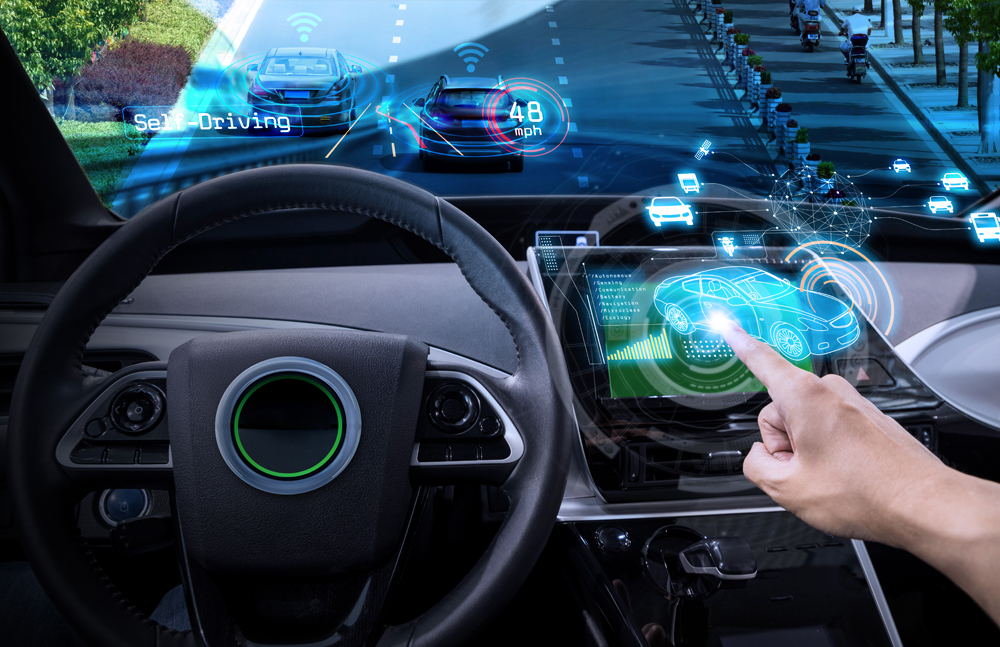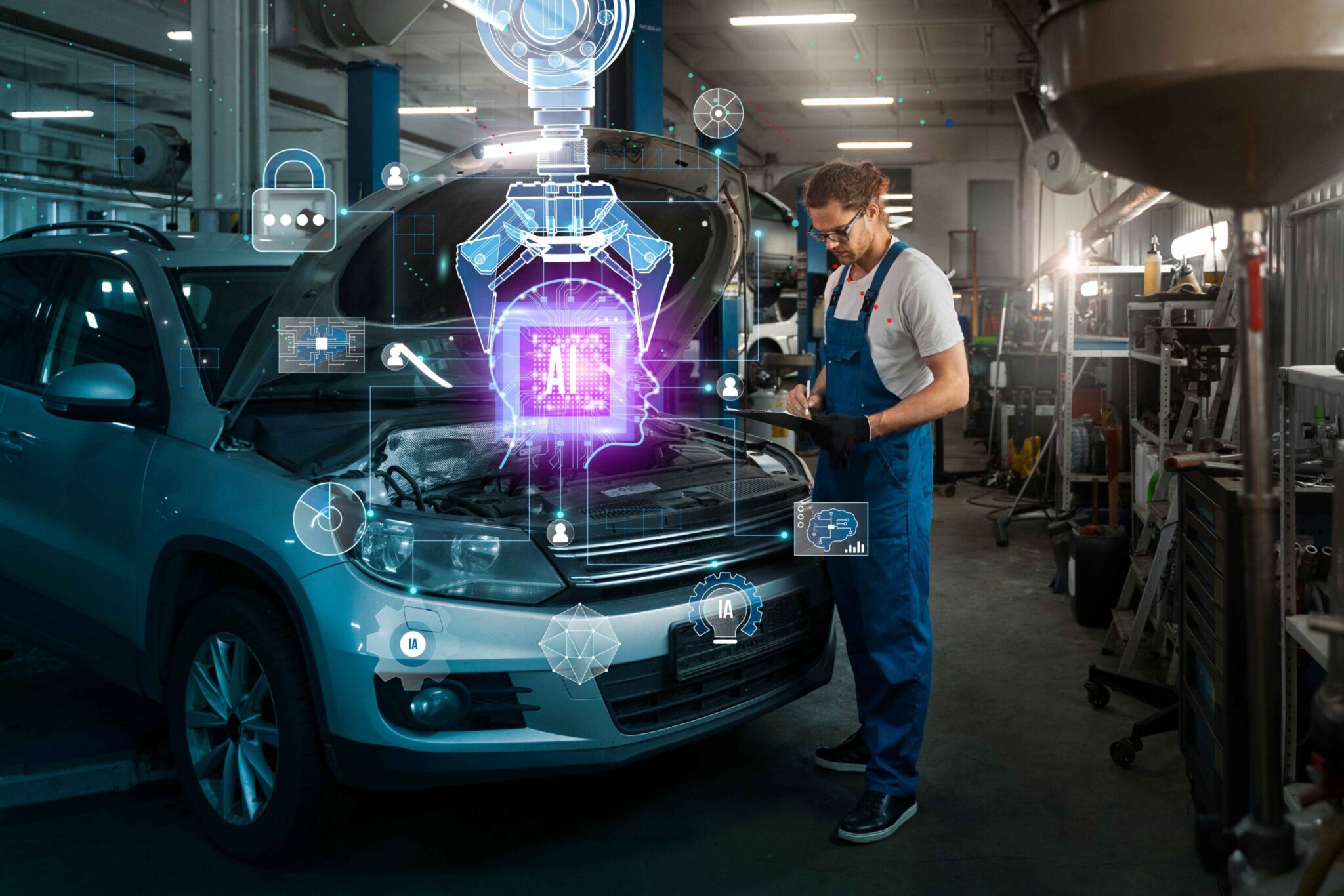the evolution of artificial intelligence in the automotive industry: shaping the future of mobility
INTRODUCTION
The Automotive Industry stands at the forefront of a technological revolution, and at the heart of this transformation lies Artificial Intelligence, or AI. With the rapid advancements of machine learning, computer vision, and data analytics, AI has become a driving force, quite literally, in the automotive world. From autonomous vehicles that navigates our roads independently to intelligent driver assistance system that enhance safety and convenience, AI is reshaping how we interact with and perceive our cars. In this ever-evolving landscape, the integration of AI in the automotive industry is more than a mere trend; it’s a transformative leap into the future of transportation, promising greater safety, efficiency, and sustainability. The Automotive industry has undergone a technological revolution, and the integration of Artificial Intelligence (AI) has been a cornerstone in shaping the future of mobility. From autonomous vehicles to advanced driver- assistance system (ADAS). AI’s impact on the automotive sector has been profound, revolutionizing safety, efficiency, and overall driving experience. This article aims to explore the multifaceted role of AI in the automotive industry, it’s current applications, and the future potentials it holds.

AI in Autonomous Driving
Autonomous Driving is one of the most transformative applications of AI in the automotive industry. Companies like Tesla, Waymo, and traditional automakers have been investing heavily in developing self-driving vehicles. AI-Powered systems in these vehicle uses a variety of sensors such as cameras, lidar, and radar and ultrasonic sensors to perceive the environment, enabling the car to make real-time decisions. Machine Learning Algorithms play a pivotal role in recognizing objects, pedestrians, road signs, and lane markings. They continuously improve through data collected from various riving scenarios, allowing the vehicles to navigate complex environments, predict behaviour, and adapt to different road conditions. As technology advances, the industry anticipates the widespread adoption of fully autonomous vehicles, promising safer and more efficient transportation. Autonomous Driving, once a concept of the distant future, is rapidly becoming a present day reality, largely due to the groundbreaking integration of Artificial Intelligence (AI). AI is the linchpin of this technological marvel, empowering vehicles to perceive, comprehend, and respond to the ever-changing dynamics of the roads.
Through a sophisticated network of sensors, machine learning algorithms, and advanced computing systems, AI enables cars to make split seconds decisions, navigate complex environments, and operate without constant human intervention. The fusion of AI in autonomous driving is not merely a leap in automotive technology, it’s a seismic shift in how we conceptualize transportation, promising safer, roads, increased mobility, and a glimpse into a future where to once unimaginable prospect of self-driving vehicles is rapidly becoming a tangible and transformative reality.

Enhancing Safety with ADAS
Advanced Driver-Assistance System (ADAS) represent another significant advancements powered by AI. These systems are designed to assist drivers in the driving process by providing features like adaptive cruise control, lane departure warning, automatic emergency braking, and parking assistance. AI algorithms analyze data from sensors and cameras in real-time, enabling quick responses to potential hazards and enhancing overall road safety. For instance, features like automatic emergency braking use AI to detect obstacles or pedestrians in the Vehicle’s path, applying brakes when necessary, thereby potentially preventing accidents. Lane keeping systems use AI to monitor the vehicle’s position within lanes, alerting drivers or autonomously correcting the steering to avoid unintended lane departures. These technologies not only mitigate accidents but also pave the way for a future where roads facilities are significantly reduced. Safety has always been a cornerstone of the automotive industry, and with the integration of Advanced Driver Assistance System (ADAS) powered by AI. A new era of safety measures has emerged. ADAS, enabled by the capabilities of AI, introduces a suit of intelligent features designed to mitigate risks and enhance safety of the roads.
These systems equipped by sensors, camras, and AI-Driven algorithms, work cohesively to detect potential hazards, assist drivers in critical situations, and even intervene autonomously to prevent accidents. The amalgamation of AI in ADAS is revolutionizing vehicle safety, transforming cars into vigilant partners that proactively protect both drivers and pedestrians.

AI in Vehicle Manufacturing and Design
AI is not only transforming the driving experience but also revolutionizing vehicle manufacturing and design processes. Manufacturers are employing AI to streamline production, optimise supply chains, and improve quality control. AI-Powered robots are increasingly utilize in assembly lines for tasks like welding, painting, and quality inspection. Machine Learning Algorithms analyze vast amount of data to predict maintenance deeds, reducing downtime and ensuring smoother operations. In the realm of design, AI is playing a crucial role in creating more aerodynamic and fuel-efficient vehicles. By Simulating and Analyzing various design possibilities, AI can optimize shapes and structures to enhance performance and reduce fuel consumption. The Automotive Industry is witnessing a profound transformation in Vehicle manufacturing and design, owing to the integration of Artificial Intelligence (AI). AI has emerged as a pivotal force revolutionizing the traditional methods of creating and conceptualizing Vehicles. From the inception of an idea to the manufacturing floor.
AI is optimising processes, streamlining operations, and enhancing design precision. By harnessing machine learning algorithms, predictive analytics, and automated systems, manufacturers can now create smarter, safer, and more efficient vehicles.AI’s influence in vehicle manufacturing and design is not just about innovation; it’s a fundamental shift towards optimise production, reducing costs, and delivering vehicles that align more closely with the evolving needs and desires of consumers.

Challenges and Ethical Considerations
While the integration of AI in Automotive technology brings numerous benefits, it also presents challenges. Cybersecurity remains a major concerns as vehicles becomes more connected and reliant on AI system. Ensuring the security of these systems against hacking and data breaches as crucial to maintaining user safety. Ethical Considerations particularly in Autonomous Vehicles are also a subject of debate. Determining how AI makes decision in critical situations, such as potential accidents where human lives are at risks, poses significant ethical dilemmas. Addressing these challenges requires a multidisciplinary approach involving policymakers, technologists, and ethicists to establish guidelines and regulations. The integration of Artificial Intelligence (AI) in the automotive industry heralds a wave of innovation and advancements, yet it also brings forth a unique set of challenges and ethical considerations. As AI permeates every aspects of vehicle technology, from autonomous driving system to manufacturing processes, questions arise regarding safety, liability, and the ethical implications of these intelligent system.
Ethical Considerations encompass a spectrum of dilemmas, including issues surrounding data privacy, the moral choices AI might need to make in critical situations on the road, and the broader societal impacts of AI-Driven transportation. As we navigate this landscape of groundbreaking innovation, it’s imperative to explore and address the challenges and ethical quandaries arising from the symbiotic relationship between AI and the automotive industry.

The Future Of AI in Automotive Industry
The Future of AI in the Automotive Industry holds immense promise. Continued advancements in AI algorithms, coupled with the emergence of 5G technology will further enhance the capabilities of autonomous vehicles. Additionally, the integration of AI with the Internet of Things (IoT) will lead to more connected and smarter vehicles, enabling seamless communication between vehicles and infrastructures, ultimately contributing to reduced congestion and enhanced traffic management. The future of the automotive industry is being shaped by an unprecedented synergy with Artificial Intelligence (AI), which promises to revolutionize the way we perceive and engage with transportation, AI-Driven advancements have already ushered in autonomous vehicles advanced safety features, and personalize user experience, but this is just the beginning. As we ventures into the uncharted territories of tomorrow, the marriage of AI and automotive technology is set to redefine mobility, safety, and sustainability. This synergy not only assures enhanced convenience and safety but also offers a vision of eco-friendly, interconnected transportation system that are deeply intertwined with smart cities.
Moreover, AI will continue to evolve in predictive maintenance, ensuring vehicles are serviced before breakdowns occurs, thereby reducing downtime and increasing overall reliability.



